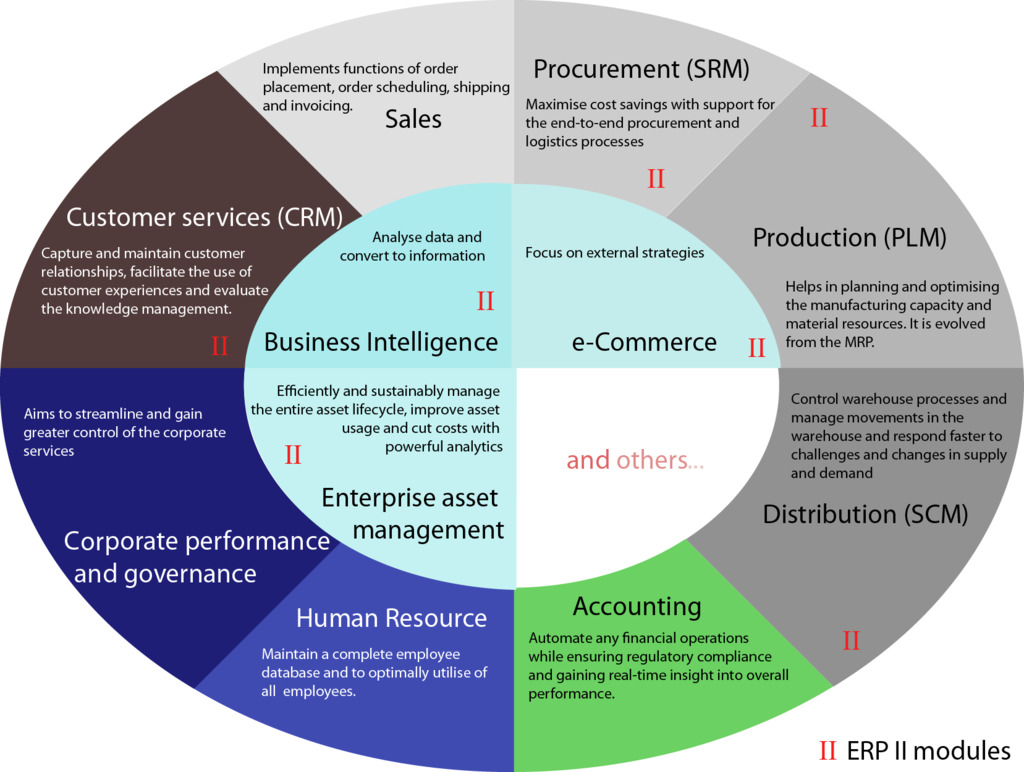Introduction – What is ERP Software?

Enterprise Resource Planning or ERP for short is type of business software designed to facilitate the integrated management of key business processes. Using common databases, ERP provides a unified view of core business processes. The data is shared across departments by the applications that comprise the system.
The ERP system integrates various organizational systems and allows for error-free transactions and production, thereby increasing the organization’s overall efficiency.
Some examples of functionality handled by ERP software includes the following:
- Accounting operations
- Project management
- Risk management & compliance
- Supply chain operations
- Performance & budget planning
- Human resources & staff management
ERP systems connect a variety of business processes and allow data to flow between them. ERP systems eliminate data duplication and provide data integrity with a single source of truth by collecting an organization’s shared transactional data from multiple sources.
ERP systems are now essential for managing thousands of businesses of all sizes and industries making it a core technology.
What are some factors to consider when choosing an ERP system?

When it comes to choosing a solution there are a number of options so having some factors to help make a decision can be helpful.
Here are some points to consider when choosing an ERP system for your company:
- Custom software or off the shelf: Depending on the needs of your business you may want to have a custom software program developed to collect and manage the relevant business information for your needs. Off the shelf products can also be helpful if your needs are not specific and you just need general features then buying an existing product may be ideal.
- Integrations: Ideally your ERP solution should integrate with the tools and systems you already use or allow you to migrate your data relatively easily. For example if your solution includes CRM capabilities you should be able to transition your current CRM and it’s data. Another example would be integration with systems like Microsoft Office 365 for documents or Dropbox for storage.
- Staff training: Any type of new software will require some training to up-skill staff on using it, the complexity and usability of an ERP solution is important to consider as it will determine how long it may take to train your staff.
- Cloud hosted or on-premise: Depending on the system you choose it may be hosted in the cloud or software you need to install on your own servers which will require some IT costs and maintenance to keep your hardware up-to-date and running well.
- Options for expansion: As your organization grows so will your software requirements so been able to scale your system and data management is key. It’s important to choose a system that can support your growth into the future and can adjust up and down as your needs change over time.
Pros and cons of an ERP system
Pros:
- Reduce unnecessary paper as records can be managed electronically
- Reporting on different aspects of the organization, often in real-time
- Automation for different business functions reducing errors and saving you time
- Consolidate data across various departments and track everything with key metrics or performance indicators
- If hosted in the cloud can be accessed anywhere on any device regardless of Operating System and processor type.
Cons:
- Upfront installation cost and potential ongoing licensing fees
- If self-hosted (on-premise) maintenance and IT support costs must be considered
- An off the shelf product may include lock-in or not allow you to customize certain aspects of the software
- Potential add-on fees required to access different features
Conclusion
We hope you found this entry to be useful, if so please consider sharing it on social media or with someone you think would benefit.
AGR Technology is a independently owned Australian business providing a range of digital services to other businesses including Digital Marketing, Software Development and Web Design/Hosting.
Find out more about our services or check out our blog and videos for more content.
Other content you may also like from our glossary:
Learning Management System / e-learning
CMS (Content Management System)
Source(s)/Citations:
Shing Hin Yeung, CC BY-SA 3.0 <https://creativecommons.org/licenses/by-sa/3.0>, via Wikimedia Commons
Enterprise resource planning. (2021, April 27). Retrieved May 03, 2021, from https://en.wikipedia.org/wiki/Enterprise_resource_planning
What is erp? (n.d.). Retrieved May 03, 2021, from https://www.oracle.com/erp/what-is-erp/
![logo-new-23[1] logo-new-23[1]](https://agrtech.com.au/wp-content/uploads/elementor/thumbs/logo-new-231-qad2sqbr9f0wlvza81xod18hkirbk9apc0elfhpco4.png)
